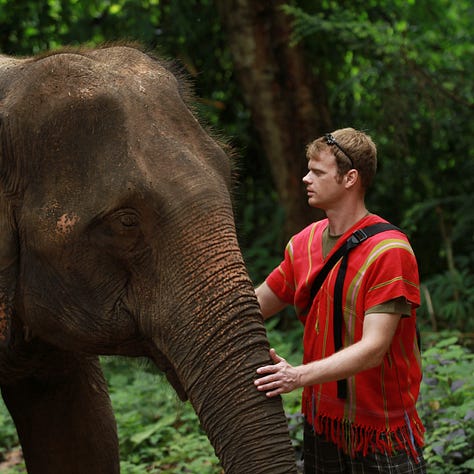Finding Stoicism
An Antidote to Outrage, Victimization, and Fear
Welcome to Polymathic Being, a place to explore counterintuitive insights across multiple domains. These essays explore common topics from different perspectives and disciplines to uncover unique insights and solutions.
Today's topic wrangles with the very misunderstood philosophy of Stoicism and how it provides an antidote to the craziness of the world today. We’ll explore what Stoicism really is, how it underpins the philosophy of Polymathic Being, and how you can use it to create stability, regain agency, and properly contextualize the world.
Intro
I remember growing up hearing the term Stoic as meaning the suppression of emotion. A stoic person was one who could watch the most emotional events and remain unfazed. They were the master of emotion and rarely did that facade break. It wasn’t until 10 years ago, when I really started to study actual stoic philosophy, that I realized how badly we have maligned what stoicism actually is.
Stoicism is not at all what we just described. It’s the art of feeling, experiencing, appreciating, embracing, and regulating our emotions. As Nassim Taleb said:
“Stoicism is about the domestication of emotions, not their elimination.”
In a world that pressures us to worry or panic about everything, news agencies that feed us fear porn, and the social demands to support the current thing; it’s no wonder that anxiety and depression abound. Yet, why do we have so much angst about our situation in a world that has never been safer, healthier, or more open? I wager it’s because of three things.
We lack challenge, which human existence has coded into our psyche to expect. Counterintuitively, the ‘easy’ life isn’t easy when the brain can’t accept that it is that easy. Instead, it goes into panic mode, assuming we’ve missed some catastrophe bearing down on us, a topic we explored in Apocalypse Always and as Seneca wrote:
“Even when there is nothing wrong, nor anything sure to go wrong in the future, most mortals exist in a fever of anxiety.” - Epistles 13.13
We are coded, at our base, to be emotional beings. Jonathan Haidt captures this very well in his book The Happiness Hypothesis, in which he likens our emotions to an elephant and our reason to the rider. No matter how ‘in control’ the rider believes themselves to be, our elephant can still override our better sensibilities, a topic we dove into with Elephant Riding.
Society pressures us to ignore our own agency, instead constantly looking to blame others, claim victimization, and accept the depressing position of not being in control. This is the worst of these behaviors and, when coupled with #1 and #2, creates a ton of issues, a problem we explored in Agency vs. Addiction.
These three challenges are exacerbated by the modern push toward emotional intelligence, where emotional expression is heavily favored as the counter to emotional suppression. We are told we need more empathy and more emoting while missing the challenge that uncontrolled emotion is a pathology, not a strength!
Uncontrolled emotion is the foundation of our outrage, victimization, and fear based cultures. Emotions are the fuel that feeds the social media algorithms that serve us more outrage. Emotions trigger the dopamine that keeps us hooked. Ironically, this idea misses the entire point of Daniel Golemans’ book Emotional Intelligence1
So, what do those three points have in common? They’re what the Stoics have studied for millennia, and they have solutions for managing each and every one of these challenges. Simply put, we are experiencing a lot of societal problems because we’ve turned our back on what Stoicism actually is.
Finding Stoicism
Let’s first double down on the idea of Stoicism describing a lack of emotions that I grew up with and start with what the Stoics actually say. I collaborated once more with Andrew Perlot from Socratic State of Mind on the following foundations:
I should not be unfeeling like a statue; I should care for my relationships both natural and acquired – as a pious man, a son, a brother, a father, a citizen. - Epictetus, Discourses 3.2.4”
Now, am I urging you to be hard-hearted, do I ask that you betray no emotion at the funeral, do I refuse to let your spirit even be touched? Not at all.
It would be barbarous, not courageous, to watch the burial rites of one’s own – with the same eyes that watched them while living – and not be moved as one’s family is first torn apart. -Seneca, Epistles 99.15
If all emotions are common coin, then what is unique to the good man? To welcome with affection what is sent by fate. Not to stain or disturb the spirit within him with a mess of false beliefs. -Marcus Aurelius, Meditations
Clearly, emotions have value. Stoicism doesn’t ignore or suppress them. It recognizes that emotions are the elephant in the room. Stoics feel them, note them, understand them, and do not let others control them. Most importantly, Stoicism is about not letting others control them. Stoicism centers the rider as the master.
Any person capable of angering you becomes your master; he can anger you only when you permit yourself to be disturbed by him. -Epictetus
Choose not to be harmed—and you won’t feel harmed. Don’t feel harmed—and you haven’t been. -Marcus Aurelius, Meditations 4.49
So, if the Stoics recognize that they are the rider, how do you control a five-ton elephant? The key here is that you don’t, at least not completely. But learning how your elephant reacts to things means you can steer it away from situations that can cause it to stampede.
In the fantastic book, The Subtle Art of Not Giving a F*ck, author Mark Manson identifies many of the ways you can teach your rider to manage the elephant. This book may be the most modern-day articulation of stoic philosophy you can find. You literally don’t have enough F*cks to give and maintain sanity; you can’t apply them everywhere. Let’s shift gears and look at where to focus our energy.
Applying Stoicism
The first step is to zoom in and back out on the topic. It’s the foundation of intentional reframing that underpins Polymathic Being’s idea of Systems Thinking and the value of Irreverence we explored with Andrew Perlot a few weeks back.
The second step is to apply lessons from real elephant riding that I learned on a trip to Thailand in 2012. Before you ride the elephant, you have to check out its health.
You look into their eyes to make sure they’re seeing clearly. (Photo 1)
You look at their teeth to see that they’re eating properly (Photo 2)
You look at their poop to make sure they're digesting correctly (Photo 3)



How apropos to emotions where we need to make sure our vision isn’t clouded, we are consuming the right materials, and dealing with the shit that we have to process on a daily basis. This is literally the core of Stoic Philosophy.
The third step is to remind ourselves that we have individual agency. We can take ownership of our elephant, our actions, and our reactions. We can claim our autonomy back from those who seek to control us and take intentional control where we’ve unknowingly abdicated our own agency.
The fourth and final step is to not fall into the siren call of looking at everyone else’s problems and bringing them into your life. You’ve got enough on your hands with your own emotional elephant. Even 2,000 years ago, Marcus Aurelius knew this. “Other people’s mistakes?” he reminded himself, “should be left to their makers.” Forget what other people are doing; forget what they’re doing wrong. You’ve got enough on your plate. Focus on yourself and fix that.
None of this is easy, and that’s why Stoicism is such a difficult philosophy to embrace. Through my years of experience, I’ve learned that Plato was right when he said, "The only thing I know is that I know nothing.” As such, I’ve decided to Embrace My White Belt and constantly seek to learn. That, too, is another element of Stoicism.
Yet, when we begin to master these ideas, we find true freedom.
No one who is afraid or distressed or troubled is free; and whoever is released from distress and fear and trouble, is in the same way released from slavery. -Epictetus, Discourses 2.1.24”
If you would attain real freedom, you must be the slave of philosophy. -Epicurus, quoted in Seneca, Epistles 8.7”
Summary
I’d be loath not to close with the main elements of Stoic Virtue that focus on Wisdom, Justice, Courage, and Moderation. Today, we covered Wisdom of learning, Moderation of emotion, and Courage to take new action. See, you’re already applying some of the Stoic concepts just by being here and reading this.
I hope you can start embracing, understanding, and harnessing your emotions to maintain your agency, keep yourself balanced, and thrive in a chaotic world. Finding stoicism truly is an antidote to outrage, victimization, and fear cultures.
As we wrap up, I want to share five great resources from the Socratic State of Mind that you can bookmark for future applications. Remember, this is a journey of a thousand steps, not a once-and-done, but the emotional clarity is worth the journey.
Five Way Stoicism Improved My Life - Real-life examples of Stoicism applied.
How To Journal Like A Philosopher - Harnessing self-reflection for growth.
Epictetus’s Key Insight for Taking Back Our Lives - How to exert agency.
Four Habits of Wise People in Foolish Countries - Surviving Politics.
How to Stop Making Mistakes You Really Want to Make - Counterintuitive.
Did you enjoy this post? If so, please hit the ❤️ button above or below. This will help more people discover Substacks like this one, which is great. Also, please share here or in your network to help us grow.
Polymathic Being is a reader-supported publication. Becoming a paid member keeps these essays open for everyone. Hurry and grab 20% off an annual subscription. That’s $24 a year or $2 a month. It’s just 50¢ an essay and makes a big difference.
Further Reading from Authors I Appreciate
I highly recommend the following Substacks for their great content and complementary explorations of topics that Polymathic Being shares.
Goatfury Writes by Andrew Smith: All-around great daily essays
Never Stop Learning by Martin Prior: Insightful Life Tips and Tricks
Cyborgs Writing by Lance Cummings: AI tips for Thinking and Writing
Educating AI by Nick Potkalitsky: Integrating AI into education
Mostly Harmless Ideas by Alejandro Piad Morffis: Computer Science for Everyone
More subtly, the battle over emotions carries the idea that men's less emotive nature is bad and the emotive nature of women is better. But this ignores the fact that men and women express emotions differently. I always laugh when people talk about ‘emotionless men.’ I just ask them to reflect on men at sports events, Soldiers at memorials, guys at bars, social events, etc. The one constant here is a spectacular expression of emotion. It’s just not the same as how women express emotion.








![Emotional Intelligence: Why It Can Matter More Than IQ [Book] Emotional Intelligence: Why It Can Matter More Than IQ [Book]](https://substackcdn.com/image/fetch/$s_!mtzO!,w_1456,c_limit,f_auto,q_auto:good,fl_progressive:steep/https%3A%2F%2Fsubstack-post-media.s3.amazonaws.com%2Fpublic%2Fimages%2Fe902e216-d17e-4d22-9ff9-2cc3ee6eb1ef_1699x2560.jpeg)




The really cool thing about stoicism is that it works. The sucky part is that it takes a long time to get good at it, but once you grasp the idea that you're on top of an elephant, things start to get a little more clear.
Another banger guys. Love when you two collaborate. Emotional intelligence is not a new concept. Stoics have been practicing and preaching it for millennia. We just now have updated books and data to back it and phenomenal writers like you two to demonstrate it!